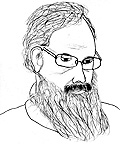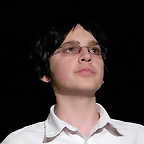
|
| Kevin Karplus's home page |

|
| Abe's theater page |
For Fiesta de los Artes at Bay View Elementary School (5 April 2003), I set up a rocket-decorating table with 5 rocket launchers---it was a very popular activity. Using colored (and black) vinyl electrical tape proved to be the most popular decorations, though shiny metallic paper with adhesive backing was also popular. Lick-and-stick stickers were not very popular, but 1-cent Kestrel stamps were moderately popular.
I did this project again for Abe's 5th grade class (not including decorating the rockets), where it was very popular. We spent some time before the launching discussing Newton's laws and how rockets worked, and some time afterwards discussing what one could measure on the rocket launches and how to test various ideas about increasing the height rockets went to. For more information about experiments to do with rockets see http://exploration.grc.nasa.gov/education/rocket/TRCRocket/RocketActivitiesHome2.html , particularly http://exploration.grc.nasa.gov/education/rocket/BottleRocket/index.htm
Their other text, Introductory Physical Science, is also supposed to be pretty good. I have recently gotten a copy of the 8th edition and was a bit disappointed. The chemistry emphasis is a reasonable complement to the physics emphasis of F, M, and E, but the writing is poorer. The investigations have the kids guessing what will happen with no theory to base the guesses on. There are irrelevant questions mixed into the first chapter, and the book makes the common error of "inquiry-based" books of focusing so hard on "what happens" that they forget to discuss why. For example, in the first chapter the kids heat up baking soda to get a gas, but there is no discussion of what the gas is or why heating baking soda makes it release a gas.
I've not looked at Hewitt's books yet, but I've seen recommendations for them in a few places.
In addition to various career-guidance sorts of things, there are a bunch of lesson plans, but I have not looked at them to see whether they are any good. I looked at the summaries of a few of them, and they look like good ideas for fun projects, but they would need to be integrated into a coherent curriculum.
From the Stanford alumni newsletter: Ever wonder how jelly beans are made? Or how plastic food containers get made? Then visit the new Stanford Web site that shows kids and adults how more than 40 products are made. The online videos are geared toward both engineers and non-engineers. Click on ``How Everyday Things Are Made.''
There are a few assignments that could be used to scare kids, since they ask questions with large vocabular that is not explained elsewhere on the site (for example, the first question of assignment 1 asks " What do you think is the most probable inheritance pattern for the deafness allele in this family?
Pitsco also has a great line of "engineering" toys and projects: mousetrap cars, solar cars, matchstick bridges, ... .
The electric bell kit was not well made or designed. The hole in the lug for the adjusting screw was too small and had to be drilled larger, and the various parts are not firmly held in place when the bell is assembled so the bell will fall apart if shaken too hard or turned upside down. The parts are so loosely held in place that the hammer needs constant readjustment for the bell to ring at all. It was ok for a $7 kit, but I'd have preferred to pay $9 and get something that worked more reliably with less adult assistance neeeded.
The $35 130-in-1 Electronics Lab, on the other hand, seems to be quite a good design, and the book of instructions that comes with it is well written, suggesting several ways that a child (or adult) can try modifying each circuit. The spring terminals are easy for a child to use and hold wires securely. My son has no trouble following the wiring instructions in each experiment by himself (he did the first one with me, and the next two by himself). The selection of components on the board is a good one, with several standard analog parts (resistors, capacitors, diodes, transistors, loud speaker, transformer, ...) and a few digitial ones. This is not the best kit for learning digital electronics, but it looks like value for money for analog circuit play. (Target age of the text and circuits seems to be 12-18-year-olds.)
|
|
Questions about page content should be directed to
Kevin Karplus
Biomolecular Engineering
University of California, Santa Cruz
Santa Cruz, CA 95064
USA
karplus@soe.ucsc.edu
1-831-459-4250
318 Physical Sciences Building